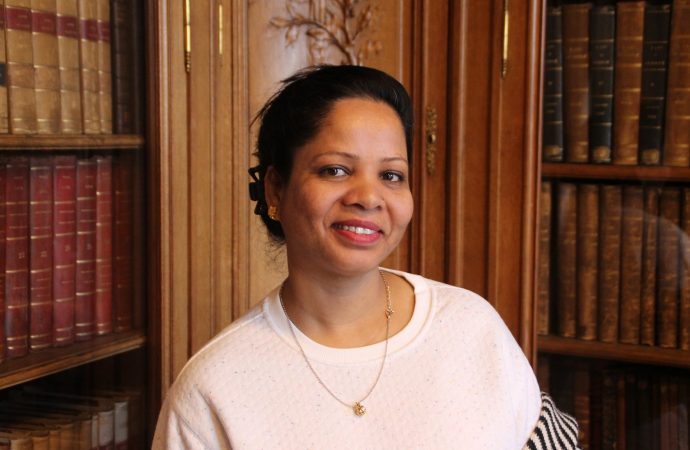By Elise Ann Allen
ROME (Crux) — Nearly two years after her release from prison, and as another Christian man has been sentenced to death in Pakistan, Asia Bibi is calling for the country’s strict blasphemy laws to be changed in order to allow better protection for minorities.
Speaking to representatives of Catholic charity organization Aid to the Church in Need (ACN), Bibi said “Pakistan is not just about minorities or majorities; Pakistan is for all Pakistani citizens, so therefore religious minorities should also have the same rights of citizenship, and the law in Pakistan says that everyone should be able to live in freedom, so this freedom must be guaranteed and respected.”
Asked what she would say to countries that hold religious freedom as a “second-rate” freedom, Bibi said that since Pakistan’s independence in 1947, leaders guaranteed freedom of religion and thought “to all citizens.”
“Today there are some groups who are exploiting the existing laws,” she said, and issued an appeal to Pakistani Prime Minister Imran Khan on behalf of all victims of the blasphemy law and forced conversions “to safeguard and protect minorities, who are also Pakistani citizens.”

“I, as a victim myself, am speaking from my own experience,” she said. “I suffered terribly and lived through so many difficulties, but now I am free, and I hope that these laws can be changed in such a way as to prevent any abuse of them.”
Bibi gave her interview as the two-year anniversary of her release from prison approaches.
In 2010 Bibi was accused of blasphemy following an altercation with fellow farmhands, who refused to drink from the same water jug as a Christian. She was then jailed, her case was taken to court, and she was sentenced to death.
Two government officials, Punjab governor Salman Taseer and Federal Minorities Minister Shahbaz Bhatti were murdered after voicing public support for Bibi and criticizing Pakistan’s blasphemy law.
After spending nearly 10 years on death row, Bibi was finally released in October 2018 after a landmark ruling by Pakistan’s Supreme court acquitting her of the charges and ordering her immediate release. However, after a wave of protests erupted, she was ordered not to leave the country until a challenge to her acquittal had been heard.
Bibi’s innocence was upheld by the Supreme Court in January 2019, allowing her to leave Pakistan. She and her family then moved to Canada, where they have lived for the past year and half.

As Bibi’s message was aired, a court in the eastern Pakistani city of Lahore sentenced a Christian man, Asif Pervaiz, to death under the country’s blasphemy law, after he was accused of sending blasphemous text message to his former boss.
According to his lawyer, Saif-ul-Malook, Pervaiz, 37, has been in custody since 2013 after his former supervisor at the hosiery factory where he worked said Pervaiz sent him several blasphemous text messages about Islam and the prophet Muhammed.
Pervaiz has denied the allegations, saying his supervisor, Muhammad Saeed Khokher, pressured him to convert to Islam, which he refused to do. Pervaiz said he later quit working at the factory but was confronted by Khokher, who continued to push for his conversion. When Pervaiz refused again, he said his former boss accused him of sending the blasphemous text messages.
Khokher has denied that he pressured Pervaiz to convert, insisting that there are other Christian employees at the factory, yet none have made similar allegations.
Under Pakistan’s strict blasphemy laws, there is a mandatory death penalty for insulting Muhammad, as well as severe penalties for other crimes such as insulting Islam, the Quran, or certain Muslim holy figures.
According to the United States Commission on International Religious Freedom (USCIRF), there are currently 80 people who are imprisoned in Pakistan for blasphemy, at least half of whom face life-sentences or the death penalty.
Though the majority of those accused are Muslim, as 98 percent of Pakistan’s population adheres to Islam, critics have argued that the laws disproportionately target minorities such as Christians and Hindus, who are falsely accused due to discrimination rather than guilt.
In her conversation with ACN, Bibi thanked all those who advocated for her and helped to secure her release, saying she “suffered greatly” during her time in prison, but “I feel such joy, because God has freed me from the difficulties in which I found myself.”
Sending a message to other Christians who have been persecuted or forced to convert in Pakistan, including teens Huma Younus and Maira Shahbaz – who were kidnapped from their homes, forced to convert to Islam and marry a Muslim man, Bibi urged parents to “never leave their daughters on their own.”
“I know that these girls are persecuted,” she said, and asked Khan to help the girls return home, “because none of them should have to suffer like this!”
Bibi said she still has a rosary that was given to her husband and daughter by Pope Francis during a visit to Rome to advocate for her release, and that she prays it every day for “for the gift of faith and for those who are persecuted in Pakistan.”
She thanked Pope Francis and retired Pope Benedict XVI for their support, and voiced her desire to travel to Rome and to Jerusalem, “the city of the one who gave birth to the source of my faith, Jesus Christ – for it was there that he was put to death on Calvary and there that he rose again!”
